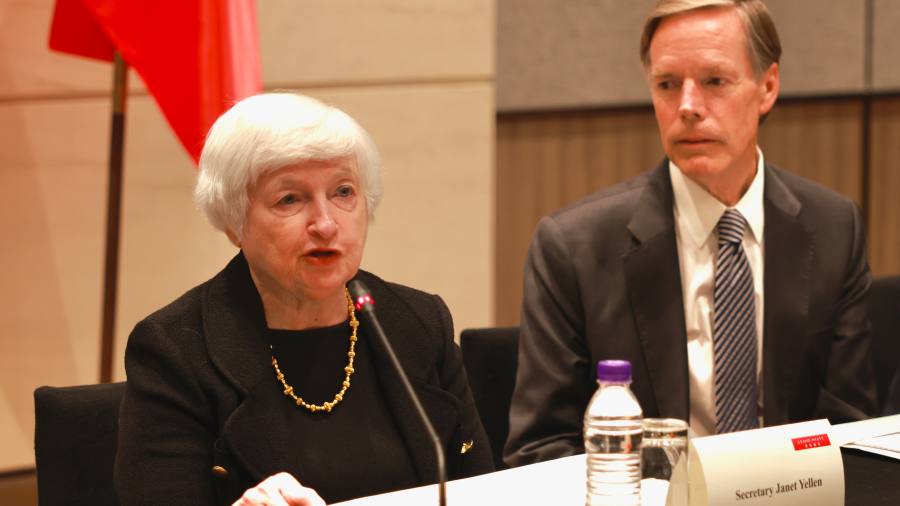Receive free US-China relations updates
We’ll send you a myFT Daily Digest email rounding up the latest US-China relations news every morning.
Janet Yellen has said that the US and China should not let disputes over national security harm economic relations as the Treasury secretary met Chinese premier Li Qiang on a visit to Beijing intended to stabilise fraught relations between the powers.
Speaking at the Great Hall of the People on Friday, Yellen said the countries had a “duty” to the world to show leadership to tackle global challenges.
But on her first visit to China as US Treasury secretary, which she expressed hope would “spur more regular channels of communication”, Yellen acknowledged that the sides would not always agree on issues such as security.
“The United States will, in certain circumstances, need to pursue targeted actions to protect its national security,” Yellen said. “However, we should not allow any disagreement to lead to misunderstandings that needlessly worsen our bilateral economic and financial relationship.”
Li noted that a rainbow had appeared over Beijing as Yellen landed on Thursday and suggested that it bode well for the future of the relationship, which has sunk to its lowest level since diplomatic relations were established in 1979.
“I think there is more to China-US relations than just wind and rain,” Li said. “We will surely see more rainbows after going through the wind and rain.”
Yellen’s remarks came several hours after she assured US business executives that she would voice concerns about Beijing’s punitive actions, including the escalating pressure on companies and possible Chinese export controls on critical minerals
“I am communicating the concerns that I’ve heard from the US business community, including China’s use of non-market tools like expanded subsidies for its state-owned enterprises and domestic firms, as well as barriers to market access for foreign firms,” she said at the American Chamber of Commerce.
Yellen arrived in Beijing several weeks after US secretary of state Antony Blinken became the first cabinet secretary to visit China during Joe Biden’s presidency. Both sides are seeking to steady ties after Biden and Chinese president Xi Jinping agreed in November to set a “floor” under the relationship and ensure that competition did not veer into conflict.
That impetus was derailed when a suspected Chinese spy balloon crossed North America before being shot down in February.
Yellen said she was “particularly troubled” by Beijing’s recent punitive measures, including a crackdown on US due diligence and consulting firms, an apparent effort to make it harder for foreign companies to obtain sensitive data on certain industries.
Beijing also banned Chinese entities involved in critical infrastructure from buying semiconductors from Micron, the Idaho-based memory chipmaker, a move Washington saw as retaliation for US export controls meant to frustrate Chinese efforts to obtain and develop advanced chips.
Before Yellen departed the US this week, Beijing said Chinese groups would have to apply for licences to export gallium and germanium, which are critical for making chips. She said the US was “still evaluating” the move, adding that it had highlighted the need for “resilient and diversified supply chains”.
Scott Kennedy, a China expert at the CSIS think-tank, said one goal for Yellen was to meet Chinese officials who took over top economic portfolios this year, including her main counterpart, vice-premier He Lifeng who succeeded Liu He as China’s economic tsar.
Yellen’s team has not confirmed whether she will see Liu Kun, the new finance minister, or Pan Gongsheng, the incoming head of China’s central bank. Earlier on Friday, she met Liu and Yi Gang, the outgoing governor of the People’s Bank of China.
“Yellen does not know her counterparts who oversee Chinese economic policy,” said Kennedy. “Although all big decisions flow through Xi Jinping, these individuals and their bureaucracies still matter . . . The world will be watching carefully for any signs of progress or continued deadlock.”
Zhu Feng, a foreign policy expert at Nanjing University, said the visit was not expected to produce any breakthroughs or “change the structure of bilateral relations” but could help “de-escalate some misunderstandings”.
Stay connected with us on social media platform for instant update click here to join our Twitter, & Facebook
We are now on Telegram. Click here to join our channel (@TechiUpdate) and stay updated with the latest Technology headlines.
For all the latest World News Click Here

